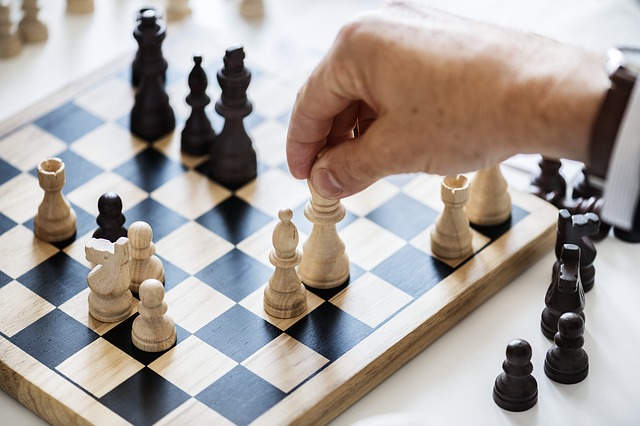Pros and Cons of Spaced Repetition When Learning French
Repetition is a great way to learn many aspects of a new language, such as the vocabulary. However, when learning French, don't put all your eggs in the repetition basket as it may be detrimental to your progress.

Repetition is a great way to learn many aspects of a new language, such as vocabulary. But could it detrimental to your progress?
In my years of teaching foreign languages to many types of students, I've come more than once face to face with the infamous "flashcards."
You know the kind, right? The small cards (literal cards or via an app) students use to drill a word/phrase into their head over and over again, hoping that it'll catch on.
Spoiler Alert
It won't be enough if you want to be fluent.
I know what you're thinking: so I cannot use my tape/app/flashcards anymore?
Yes, you can.
But beyond simply answering yes or no, I think it's important to address the issue of spaced repetition in language learning, especially one so unique as French.
Why shouldn't you learn French by repeating words/phrases day in and out? And what to do instead?
This is what I'm tempting to answer here.

The Upside of Repetition in Learning French
Okay, yes. Repetition has its own benefits in language learning, as pointed by many studies.
According to this study, repeating new words creates a shortcut to access it in our brain. Which means that when you're looking to say an apple in French, you'll be able to find it in your memory relatively easily after having repeated the word "pomme."
This is why repetition is part of the answers to the question "how to learn vocabulary in French."
But, as argued by many scientists, a foreign language is a different beast to tame, and merely memorizing phrases are not enough, sometimes even useless.
This is because languages have pattern and context.
Repetition as to memorizing without understanding the pattern of said language will only lead to "being at loss" when you're trying to retrieve the words back in the heat of the moment (also known as "my brain went blank" moment).
But we're getting ahead of ourselves. Let's check out in detail the reasons why repetition is not the best way to learn French.

The Downside of Repetition in Learning French
So, why shouldn't you rely solely on repetition when you're learning French? It does sound too good to be true, doesn't it?
Repeat these phrases every day, and you'll be able to speak French in three months.
If you're looking for French lessons online and this is what they promise, run away.
Here's why.

1. You Won't Know How Sentences Work in French
One of the most important foundations you need to master to be fluent in a language is knowing how to string words into phrases that work.
The thing about French is, it's not always:
Subject + Verb + Object
J'achète un bouquet de fleurs (I buy a flower bouquet)
Sometimes it's:
Subject + Pronoun + Verb + Object
Je lui achète un bouquet de fleur (I buy a flower bouquet for him/her)
And there are many more variations.
When you're repeating these two phrases, you won't understand why it's 'lui' when the person you're buying it for is a woman.
Also, you won't know how to replicate the same structure in other situations, for example, if you want to say 'I buy a flower bouquet for you.'
To show you another example, let's see how many ways there are in French to ask a question. There are at least three variations in French to ask the same question:
Example:
Comment ça va? Ça va bien? Comment vas-tu? Tu vas bien?
(Which all mean: How are you?)
Yes, these all mean the same thing and are ALMOST interchangeable. But they play a huge role in the richness of French.
If you listen to French natives talk among themselves, you'll notice how they have so many variations in sentences to express the same thing.
How do all these variations work? You'll never know simply by repetition. Moreover, when you're talking to a French and they use a phrase variation that's not in your flashcards, you'll get stumped.

2. You Won't Know When to Break the Rules
"Know the rules well so that you can break them effectively" (Dalai Lama XIV)
Rules in French Grammar
French has been dubbed as one of the most difficult languages to learn many times over by students. One of the reasons is the intricacies of its grammatical rules.
Things as simple as prepositions have a manual-worthy of rules.
For example:
Why is it "Je mange chez Claude," but "Je mange au restaurant Claude?"
And then there is this difficulty about definite, indefinite and partitive articles - which is one of the biggest aha moments for students.
Such as:
What is the difference between "Je porte une robe" and "Je porte la robe?"
Mere repetition cannot answer these questions for you, but understanding the pattern in the French language can.
And when you don't understand the reason, you will not know how to re-use said prepositions and articles in each and every situation.
See how limiting this is?
The exceptions to the Rules
To make things more complicated (c'est la vie, mon ami), the exceptions and irregularities in French abound.
Simply repeating "ma belle amie" and "ma voiture jaune" doesn't help you understand why some adjectives come before the noun while others after.
Or if you've been memorizing "un livre" (a book), you'll be surprised to hear a French says "une livre" (a pound).
Why is it Tour de France, but Tour de l'Ain? (Ain is a region in France, it's near the Alps).
You cannot simply repeat words and phrases for hours to know them all. You have first to understand them, and then you'll know when to apply them (including the exceptions).
Not knowing this will rob you of the richness of French, that complex puzzle that makes it a beautiful language.

3. Your French Will Sound 'Robotic'
I'm not talking about talking slowly or word-by-word. There's nothing wrong with that when you're learning French!
By 'robotic,' I mean not being flexible enough.
French is notorious for its "nuances."
What is the French "nuance"? One of the most concrete examples is this: one object can have many different words to name it.
Example: châle, écharpe, foulard.
They're all what we call scarves in English. However, they have SLIGHT differences in term of appearance.
Which means that they are not synonyms, they're what the French call "nuances."
Another example: préface and introduction.
Which do you use to designate that beginning chapter in a book? It depends on the characteristic of the chapter.
Or, something more basic: bonjour, salut, coucou; which all mean "hello/hi", but some cannot be used in some situations.
So how do you know?
In what instance should you use châle instead of écharpe? When can you say coucou instead of the universal bonjour?
Something like this can never be learned in repetition. Yes, you can repeat bonjour or écharpe and use it all the time for everything. French won't judge you for it. However, if sounding native is your goal, the best is to understand the nuances.

4. You'll Never Go out of Your Comfort Zone
I may have made the French sound so rigid and strict, but it's actually quite flexible. Many students afraid of its subtlety, afraid of making mistakes. Don't be!
You can actually use this to your advantage. Once you understand the basic rules, you can explore its boundaries as you progress through your learning process.
This is another reason why repetition can be bad for you.
Repetition will stop you from exploring its layers. Meanwhile, this is the best way to grow and speak like a native user.
A few cool things you can expand when you're not limiting your learning to repetition:
- Slang use. French use slang all the time. Not in a gross way, but there are so many slang words in French that have been socially accepted.
- Getting to know different accents/words from different places (because France is not only Paris). For example, the beloved "pain au chocolat" in Paris is called "chocolatine" in Bordeaux. Interesting, huh?
- The quirky idioms. Talking about French idioms requires a whole blog post because there are so many interesting ones. For example: Elle est à fleur de peau, which can be literally translated as "She has the skin of a flower," but actually means "She is emotionally sensitive."
These are the things that you cannot master no matter how many hours you spend repeating phrases.
In Short
In a nutshell, repetition won't allow you to be adaptable to different situations.
And as a result, you'll feel stumped when trying to use it in a situation where it doesn't fit with what you've been repeating.
Hence, it can stop you from reaching your goal to speak French like natives. Or worse, you can feel demotivated before long and decide to stop learning altogether because you think you're not good enough.
Forget the courses where you need to repeat phrases after phrases. This is boring, you'll lose motivation fast, and you'll get nowhere.
There are better things to do!

How to Learn French the Better Way
Learning is experience. Everything else is just information. (Albert Einstein)
1. Mindful Repetition
As we've discussed before, repetition can be used to learn many aspects of a language. Not just any type of repetition, though. There's a technique called "mindful repetition that help you build short paths in your brain to access the words effectively.
The concept is simple: don't repeat a word/phrase just for the sake of mechanically trying to drill it into your head. Do it by concentrating fully on what you're doing:
- Track how the word "roll out" and how every element in the mouth works to produce that word and that intonation.
- Learn difficult-to-pronounce word carefully. You can also try to break it into blocks.
- Concentrate on the effort you make to produce the word/phrase and how it affects your mouth.
By doing repetition in awareness, you reinforce that memory in your brain, and you'll be able to "search it" fast when needed.
In every repetition, remember not to repeat words that don't sound right. This will lead to you a path of error for a long time. But how do you know if you're not saying it right?
For me, the best way is to ask help from French tutors. Speechling's native tutors work specifically to give you feedback on your pronunciation before your mistakes get settled in for good.

2. Use it daily
No, don't groan. It's actually pretty fun. There are so many simple things you can do daily to advance your French, and you don't have to go far to find them.
It doesn't have to be hard, serious things; comic books or even funny tweets are great. I personally loved reading children's books (with illustrations to facilitate understanding) when I was getting my degree in French Letters.
- Listen to music.
French music is great. Find something upbeat, easy to listen to, and not so fast, like this one. Another good thing to listen if you're intermediate is podcasts in French.
- Movies, please!
Some people prefer watching a movie to reading books. They're both great to see how different words are used in different contexts. I would suggest you start with a movie that you've seen in English to facilitate comprehension about the plot, especially if you're a beginner.
- Write
Writing in French is an art, and you can start learning now. Answer questions in forums. Leave comments on French blogs. You can also find a "pen-pal" with whom you can exchange emails. Don't be afraid to make grammar errors as French highly appreciate people who want to learn their language.
- Speak it!
Oy, it's dreadful, isn't it? But it's actually not. Start with someone familiar, like your French tutor/teacher/classmates. Speaking French is really the best way you can learn French and apply what you've known till now.
The most important thing is to read/watch/listen to what you like, or else you'll see it as chores/homework. When you're passionate about the subject, it's usually easier.
So, tell me, are you ready to get out of the comfort of repetition and advance your learning process?